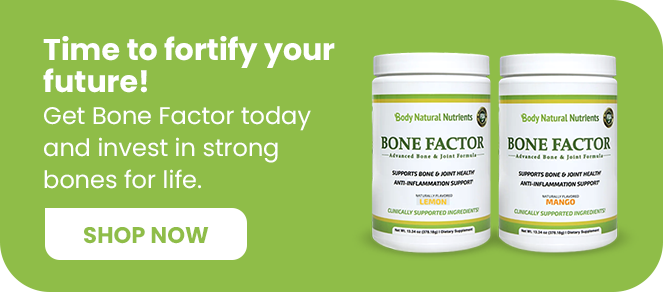Introduction
When we think about bone health, the usual suspects that come to mind are calcium, vitamin D, and regular exercise. However, what if I told you that your gut health plays an equally crucial role in maintaining strong bones? The connection between the gut and bone density is profound, yet often overlooked. Ignoring gut health can lead to a cascade of issues that weaken your bones, making them more susceptible to fractures and osteoporosis. This article dives deep into the shocking risks of neglecting your gut health and how you can use plant-based solutions to strengthen your bones.
The Gut-Bone Connection
The health of your gut directly influences the strength of your bones. Your gut is responsible for absorbing the nutrients that your bones need to stay healthy, such as calcium, magnesium, and vitamin D. If your gut is compromised, these nutrients might not be absorbed effectively, leading to bone density loss over time.
The Importance of Gut Health
Gut health extends beyond digestion. The gut microbiome, a community of trillions of bacteria living in your digestive tract, plays a significant role in various bodily functions, including immune system regulation, hormone production, and even mood stabilization. When gut health is compromised, it can lead to inflammation, nutrient malabsorption, and hormonal imbalances—all of which can negatively impact bone density. In this article, we will explore three major risks associated with ignoring gut health and provide plant-based solutions to help you maintain both gut and bone health.
How Ignoring Gut Health Can Lead to Bone Density Loss
Ignoring gut health can have far-reaching consequences, particularly on bone density. This section delves into the three main risks associated with poor gut health and how they can weaken your bones over time.
The Gut-Bone Axis: How They Are Connected
The gut-bone axis refers to the complex interactions between the gut microbiome and bone metabolism. Recent studies have shown that the gut microbiome influences bone health by regulating the absorption of calcium and other vital nutrients. The gut microbiome also produces short-chain fatty acids (SCFAs), which have anti-inflammatory properties that help maintain bone density. When the gut microbiome is imbalanced, it can lead to reduced SCFA production, increased inflammation, and impaired nutrient absorption—all of which contribute to bone density loss.
Risk 1: Increased Inflammation and Its Impact on Bone Density

One of the most significant risks of ignoring gut health is the increase in chronic inflammation. Chronic inflammation occurs when the body’s immune system is in a constant state of alert, often due to an imbalance in the gut microbiome. This inflammation can lead to the breakdown of bone tissue, reducing bone density over time.
Case Study: A study conducted by the University of Gothenburg in Sweden found that individuals with higher levels of gut inflammation had significantly lower bone mineral density (BMD) compared to those with healthier guts. The study concluded that chronic gut inflammation could be a predictor of osteoporosis, particularly in older adults.
Impact on Bone Health:
- Inflammation triggers the release of cytokines, which are proteins that signal the body to increase bone resorption—the process by which bone is broken down and its minerals released into the bloodstream.
- Over time, this process weakens the bones, making them more prone to fractures and osteoporosis.
Risk 2: Nutrient Malabsorption and Bone Weakness
The gut is responsible for the absorption of essential nutrients that are critical for bone health. Calcium, magnesium, and vitamin D are among the most important nutrients for maintaining bone density. However, when gut health is compromised, the body’s ability to absorb these nutrients is significantly reduced.
Impact of Malabsorption:
- Calcium Deficiency: Without sufficient calcium, the body begins to pull calcium from the bones to maintain normal cellular function, leading to weakened bones.
- Vitamin D Deficiency: Vitamin D is necessary for calcium absorption. A lack of vitamin D can result in poor calcium absorption and subsequent bone loss.
- Magnesium Deficiency: Magnesium plays a crucial role in bone formation. A deficiency can lead to brittle bones and an increased risk of fractures.
Fact: According to the National Institutes of Health (NIH), approximately 50% of Americans are deficient in magnesium, largely due to poor gut health and nutrient malabsorption.
Risk 3: Hormonal Imbalance and Its Effect on Bones
Gut health also influences hormone production and balance, particularly hormones like estrogen and cortisol, which play a significant role in bone health. Estrogen helps maintain bone density by inhibiting bone resorption, while cortisol, a stress hormone, can have the opposite effect when produced in excess.
How Gut Health Affects Hormones:
- The gut microbiome is involved in the metabolism of estrogen. An imbalance in the gut can lead to lower estrogen levels, increasing the risk of bone density loss, especially in postmenopausal women.
- Cortisol Production: Chronic stress and poor gut health can lead to elevated cortisol levels, which in turn accelerates bone resorption and inhibits bone formation.
Statistical Insight: A study published in the journal Endocrinology found that women with imbalanced gut microbiota had lower estrogen levels and were more likely to experience osteoporosis compared to those with a healthy gut.
Ignoring Gut Health? Here Are Plant-Based Solutions to Strengthen Your Bones

Addressing the risks associated with ignoring gut health is crucial for maintaining strong bones. Fortunately, there are plant-based solutions that can support both gut and bone health. By incorporating these strategies into your daily routine, you can help ensure that your bones remain strong and resilient.
Incorporating Prebiotics and Probiotics
One of the most effective ways to improve gut health is by incorporating prebiotics and probiotics into your diet. These substances work synergistically to create a healthy gut environment, which is essential for optimal nutrient absorption and bone health.
Prebiotics are non-digestible fibers that serve as food for beneficial gut bacteria. They help stimulate the growth and activity of these bacteria, which in turn supports gut health. Some excellent plant-based sources of prebiotics include:
- Garlic: Rich in inulin, a type of prebiotic fiber that feeds beneficial gut bacteria.
- Onions: Contains fructooligosaccharides, another prebiotic fiber that promotes healthy gut flora.
- Bananas: Provide resistant starch, which acts as a prebiotic and helps regulate gut bacteria.
Probiotics, on the other hand, are live bacteria that replenish and balance the gut microbiome. These beneficial bacteria help improve digestion, reduce inflammation, and support overall gut health. Plant-based sources of probiotics include:
- Fermented Foods: Foods like sauerkraut, kimchi, and miso are rich in probiotics and can be easily added to meals.
- Kombucha: This fermented tea is a popular source of probiotics and can be consumed as a refreshing drink.
- Tempeh: A fermented soy product that not only provides probiotics but also serves as a good source of plant-based protein.
How Prebiotics and Probiotics Support Bone Health:
- Enhanced Calcium Absorption: Probiotics have been shown to improve calcium absorption, which is crucial for maintaining bone density.
- Reduced Inflammation: Both prebiotics and probiotics help reduce gut inflammation, which, as previously discussed, can negatively impact bone health.
Anti-Inflammatory Diets to Support Gut and Bone Health
Inflammation is a key factor that can weaken bones, especially when it stems from poor gut health. Adopting an anti-inflammatory diet is an effective way to combat this and support both gut and bone health. An anti-inflammatory diet focuses on whole, plant-based foods that are rich in antioxidants, vitamins, and minerals.
Key Plant-Based Anti-Inflammatory Foods:
- Leafy Greens: Vegetables like spinach, kale, and Swiss chard are packed with antioxidants and calcium, essential for bone health.
- Berries: Blueberries, strawberries, and raspberries are rich in anthocyanins, compounds that reduce inflammation and oxidative stress.
- Nuts and Seeds: Almonds, flaxseeds, and chia seeds are excellent sources of omega-3 fatty acids, which have powerful anti-inflammatory effects.
- Turmeric: Contains curcumin, a compound known for its potent anti-inflammatory and bone-protective properties.
Sample Anti-Inflammatory Meal Plan for Bone Health:
| Meal | Description |
|---|---|
| Breakfast | Smoothie with spinach, blueberries, flaxseeds, and almond milk. |
| Lunch | Quinoa salad with kale, cherry tomatoes, avocado, and a turmeric dressing. |
| Dinner | Stir-fried tofu with broccoli, garlic, and a side of sweet potato. |
| Snack | A handful of mixed nuts and a small bowl of mixed berries. |
Enhancing Calcium and Vitamin D Intake Through Plant-Based Sources
Calcium and vitamin D are vital for bone health, and ensuring adequate intake is especially important when focusing on plant-based solutions. While dairy is often highlighted as the primary source of calcium, there are numerous plant-based options that can effectively meet your nutritional needs.
Plant-Based Sources of Calcium:
- Almonds: One of the best plant-based sources of calcium, almonds can be eaten raw or added to dishes for an extra nutrient boost.
- Tofu: Often fortified with calcium, tofu is a versatile protein source that can be used in a variety of dishes.
- Kale and Collard Greens: These leafy greens are not only rich in calcium but also provide vitamin K, which is crucial for bone health.
- Chia Seeds: Just two tablespoons of chia seeds provide about 179 mg of calcium, making them a great addition to smoothies or oatmeal.
Plant-Based Sources of Vitamin D:
- Mushrooms: Some mushrooms, such as shiitake and maitake, naturally contain vitamin D, especially when exposed to sunlight.
- Fortified Foods: Many plant-based milks, such as almond, soy, and oat milk, are fortified with vitamin D to help meet daily requirements.
- Sunlight: While not a food source, regular exposure to sunlight is an effective way to boost vitamin D levels naturally.
Tips for Improving Nutrient Absorption:
- Pair Calcium with Vitamin D: For optimal absorption, consume calcium-rich foods with a source of vitamin D. For example, pair fortified almond milk with a kale salad.
- Avoid Calcium Inhibitors: Limit the intake of foods and drinks that can inhibit calcium absorption, such as caffeine and high-sodium foods.
Preventing the Risks: Practical Tips for Maintaining Gut and Bone Health
Maintaining both gut and bone health requires a proactive approach. By integrating the following tips into your lifestyle, you can prevent the risks associated with ignoring gut health and ensure that your bones remain strong and healthy.
Regular Physical Activity and Its Dual Benefits
Physical activity is essential for both gut and bone health. Engaging in regular exercise can help improve digestion, reduce inflammation, and promote stronger bones.
Benefits of Physical Activity for Gut Health:
- Enhanced Gut Motility: Exercise stimulates the muscles in the intestines, improving gut motility and reducing the risk of constipation.
- Diverse Gut Microbiome: Physical activity has been shown to increase the diversity of the gut microbiome, which is associated with better overall health.
Benefits of Physical Activity for Bone Health:
- Weight-Bearing Exercises: Activities such as walking, jogging, and weightlifting help build and maintain bone density.
- Balance and Coordination: Exercises like yoga and tai chi improve balance, reducing the risk of falls and fractures.
Recommended Exercises:
- For Gut Health: Incorporate moderate aerobic exercises like walking, cycling, and swimming for 30 minutes most days of the week.
- For Bone Health: Focus on weight-bearing exercises such as resistance training, hiking, and dancing to strengthen bones.
Managing Stress and Its Impact on Gut Health
Stress is a significant factor that can negatively impact gut health, leading to issues like irritable bowel syndrome (IBS) and gut inflammation. Chronic stress can also affect bone health by increasing cortisol levels, which, as discussed earlier, can accelerate bone loss.
Impact of Stress on Gut and Bone Health:
- Gut Health: Stress can disrupt the balance of gut bacteria, leading to digestive problems and reduced nutrient absorption.
- Bone Health: Elevated cortisol levels due to stress can decrease bone formation and increase the risk of osteoporosis.
Stress Management Techniques:
- Mindfulness and Meditation: Practices like mindfulness meditation can help reduce stress, improve gut function, and support overall well-being.
- Regular Exercise: Physical activity is a natural stress reliever and helps regulate cortisol levels, benefiting both gut and bone health.
- Adequate Sleep: Ensure 7-9 hours of quality sleep each night to support recovery and maintain a healthy gut microbiome.
Importance of Regular Check-ups and Monitoring
Regular medical check-ups are crucial for monitoring both gut and bone health. Early detection of issues such as nutrient deficiencies, gut imbalances, or bone density loss can lead to timely interventions and better long-term outcomes.
Key Check-ups and Tests:
- Bone Density Scan (DEXA Scan): A DEXA scan measures bone mineral density and helps diagnose osteoporosis or osteopenia.
- Gut Health Tests: Stool tests, breath tests, and blood tests can provide insights into gut health, including the balance of gut bacteria and the presence of inflammation.
- Nutrient Levels: Blood tests to check levels of calcium, vitamin D, and other essential nutrients can help ensure you are meeting your bone health needs.
Conclusion: The Critical Connection Between Gut Health and Bone Density
The connection between gut health and bone density is undeniable. Ignoring gut health can lead to serious risks, including nutrient malabsorption, chronic inflammation, and ultimately, weakened bones. However, by understanding this connection and taking proactive steps, such as adopting a plant-based diet rich in prebiotics, probiotics, and anti-inflammatory foods, you can protect your gut and bone health.
It is essential to recognize the importance of a holistic approach to health, one that integrates diet, lifestyle, and regular medical check-ups. By doing so, you can prevent the risks associated with ignoring gut health and ensure your bones remain strong and healthy throughout your life.



